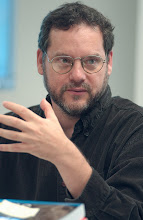Can Corporate Leadership Theorists Help Activists?
One of my favorite activist writers is Audre Lorde, a very spirited and incisive African American, lesbian-feminist thinker. who in one of her essays makes the claim, "You can't take apart the master's house with the master's tools." Now, I agree with SO MUCH of what Audre has written over the years, but I've grown to disagree with this particular statement. I no longer rule out learning about various kinds of knowledge, skills, and wisdom developed by and for folks at the top of a power pyramid--such as management and leadership theorists focused on the corporate sector of the economy. I now think we need to be careful and selective, and be able to adapt such tools, skills, and knowledge for our own purposes, but I no longer rule out anyone's tools and knowledge because of where they come from.
This came home to me most strongly when I first read books by Daniel Goleman, a psychology professor and management researcher at Rutgers University. At first it bugged me that Goleman almost never uses examples from the nonprofit sector in his writings, let alone examples from the activist wing of the nonprofit sector. Almost all of his examples are taken from large corporations. Still, it is very interesting to me that the corporate sector is paying a lot of attention and providing a lot of the funding for Goleman's research as a way to improve the quality of their own leadership. I'm now thinking that they might be on to something very important that we would overlook at our peril. Reading Goleman over the years, I've really come to appreciate his theories, research, and application suggestions for folks who are in formal management positions--and those who are not. Given the nature of his theories, it is clear that everyone in an organization can act as an influential leader no matter what their position is in an organization.
I also like how he grounds the whole notion of emotional and social intelligence in our biology and in breakthroughs in cognitive science and psychology. This is interesting stuff--fully admitting we are more than just rational thinking machines and really getting that we are social and emotional animals. Anyway, this summer I'm having my students in our online Nonprofit Leadership and Management course start our readings with Goleman's book Primal Leadership. Here is a little taste of what Goleman is up to. How do you think these ideas and insights could improve nonprofit leadership and organizational effectiveness?

